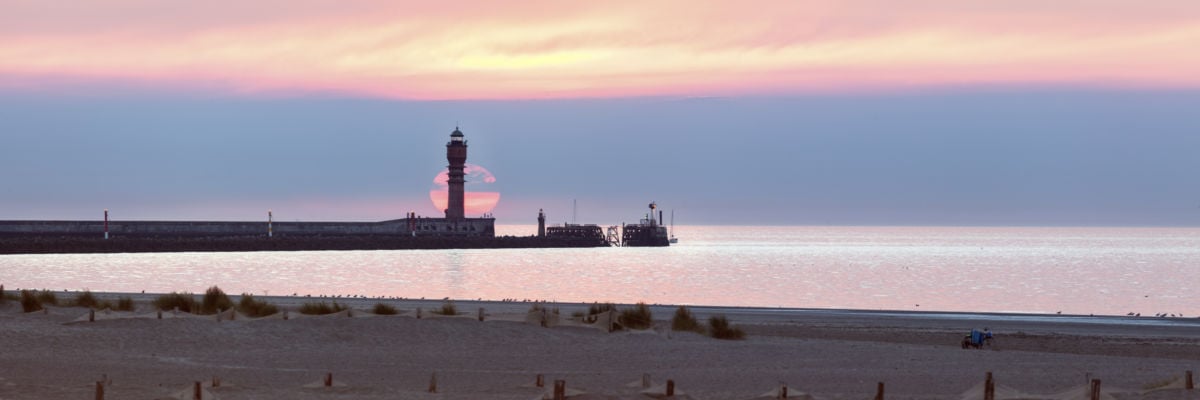
Ever hear of the Miracle at Dunkirk? This bit of World War Two history could be called the greatest and most daring rescue mission of all time—though not as great or as daring a rescue as what happened at Pentecost.
The Battle of Dunkirk, one of the largest military feats in human history, took place from May 26 to June 4, 1940. Dunkirk is a small town in France, located near the Belgian-French border and about seventy-five miles from the English coast. The intersection of three European powers made this seemingly unimportant town the crux of an all-important battle and evacuation endeavor.
In the first two weeks of May 1940, World War Two was raging, and Nazi troops swiftly conquered the Netherlands and Luxembourg. They overcame Belgium by the end of the month. Not long after, they entered France; cut off all communication between northern and southern Allied troops; and forced hundreds of thousands of soldiers northward, leaving them cornered and vulnerable to a tremendous Nazi attack.
Operation Dynamo was the codename for the evacuation mission. Naval forces drew up the plan to evacuate the Allied soldiers to England, estimating that forty-five thousand could be rescued. The plan’s execution benefited mightily from two things: unexpected calm weather on the “notoriously treacherous” English Channel and almost a thousand civilian ships and smaller boats. Many of those boats were manned by volunteers—regular civilians who made their living fishing. By the mission’s completion on June 4, it was not forty-five thousand saved from Nazi annihilation, but nearly seven times that number—more than three hundred thousand people.
Why should this story remind us of the descent of the Holy Spirit at Pentecost, celebrated this past Sunday? The spiritual life is a war, and Christ’s paschal mystery can be called a divine rescue plan for our souls. At Pentecost, the Holy Spirit rescued the apostles from Satan’s power—and not just rescued them, but made them into rescuers. Likewise for us: We should know and experience salvation as a gift, and then we must recognize that we are called to save souls, just as the disciples at Pentecost were.
The apostles were in the Upper Room because Jesus promised to send the Spirit upon them after he ascended into heaven (John 14:16-17, 16:7). Jesus’ glory in his resurrection had dispelled their fears post-crucifixion, and now they were enlisted in the army of believers who would spread the message and mercy of Christ to the ends of the earth. The disciples were ready to fight, similar to the soldiers at Dunkirk, but they were also awaiting the deliverance that only the Holy Spirit could bestow upon them.
Historians call the Dunkirk evacuation a miracle, a phenomenal success that just doesn’t make sense. Why did Hitler hold his tanks for three days and refrain from routing the Allied troops stranded on the French coast? Why did Hermann Göring, chief of the Nazi air force, miscalculate so badly in assuring Hitler that his planes alone could crush the Allies? Likewise, when we think about the miracle at Pentecost, we can ask: why does Satan, who has such a powerful grasp on human souls, see so many slip through his fingers into heaven? Why are his demons so blind to the power of grace and the perseverance of the human spirit?
As with all miracles, these questions can’t be answered according to our human understanding. The apostles didn’t try to answer them. Rather, let us ask: how do we become like the volunteer fishermen from 1940, and like those who followed Christ to their own martyrdoms? How do we become rescuers of souls and fishers of men in practical ways?
Pentecost and Dunkirk provide some answers. First, we must rely on God’s power in our lives to do great things. When we are run down and scared of the future, we must remember Pentecost and trust that God will show up. The apostles prayed ceaselessly in the Upper Room as they awaited the Paraclete. Reliance on God springs from a daily routine of prayer. A constant turn to the Father allows Christ’s army to be ready for the movement of the Spirit urging us forth to serve the lost, the least, and the last. Praying the Bible daily, turning to the Blessed Mother for aid, and visiting the Blessed Sacrament at your parish will prepare you, as a volunteer fisherman, to save souls.
Second, we must be ready to enlist in the cause of holiness—to get into our boats and rush to those in need. Who are the family members, friends, co-workers in need of an Operation Dynamo? Our job is to find them and allow God to work through us for their sake. A kind word, joyful reassurance, or a promise to keep a friend in your prayers can be a simple and easy gesture that provides a lifeline to the outcast.
The Lord accomplished the final action of his rescue mission when he sent his Spirit upon the disciples in the Upper Room two thousand years ago. The flames that rested on their heads also rest on ours. They signal us to bring the freedom of Christ to everyone we meet.
We all know the tremendous crises inflicting our world, our nation, and our Church. We can feel cornered, like the troops at Dunkirk—but in fact, we who know the Faith and have heard the call to spread the gospel have been rescued already. We’re not on the shore; rather, we should be heading for that shore to save those who are on it. We must have faith that the fire of the Holy Spirit will alight on our heads—and then get in our boats and witness to the love of Christ with our actions.
You could say the last two millennia have been a continuous Dunkirk evacuation. Christ rescued the apostles at Pentecost, and they, through their many descendants, rescued us. Now it’s our turn to be among those ordinary fishermen—to take our boats across the channel and rescue those who still need rescuing.



